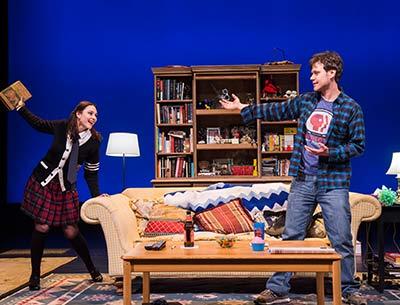Theft, Lies, and Marital Conflict

No curtain separates audience from stage in “Bluebirds,” a new play by Joe Brondo that opened last weekend at Guild Hall and will run through Sunday. The audience enters the theater to the sound of music and a brightly lit set of well-worn living room furniture placed downstage. A digital clock says it’s 12:01. After a few minutes, a man bursts through the door and runs full speed off stage left. He is followed by a woman, who turns off the theater lights with a switch on the living room wall and cuts the music with a remote aimed at the audience. A toilet flushes offstage.
We are in Sarah and Walt’s living room in a small cottage in the Hamptons, to which the couple has just returned from a surprise birthday party for Walt. After some brief, friendly bickering, she sends him outside for firewood. She locks the door after him, picks up his briefcase from the couch, and discovers inside a very old copy of “The Wonderful World of the Wizard of Oz.” Baffled, even shocked, she stuffs the book back in the briefcase before he returns.
We are bystanders in the couple’s living room while they flirt, argue, and, for 20 minutes, circle around the unacknowledged book. We know she knows he has a secret, and she thinks the secret is a present for her. While she keeps trying different strategies to get him to admit his “surprise,” he keeps trying to get her into bed.
“Bluebirds” is a fast-paced, nonstop, two-person roller-coaster ride that oscillates between humor, anger, affection, recrimination, and self-revelation. Both Sophie Vanier, who plays Sarah, and Mr. Brondo, as Walt, inhabit their characters completely. She’s the rational one, who insists that Walt take control of his life, while he’s a disappointed dreamer who feels his future is behind him.
The book is the fulcrum on which the play is balanced. Frustrated by his refusal to ante it up, she finally takes it from the briefcase and confronts him with it. When he tells her it is not only a first edition but is also signed by its author, L. Frank Baum, she asks how it came into his possession.
The answer needn’t be revealed here, but what is important is his confession that not only won’t he return the book to its owner; he has already initiated plans to sell it to a rare-book dealer in New York City for $100,000. For Walt, who makes house calls to repair computers, the book is his ticket out of a life that has grown stale and is getting worse. For Sarah, his attempt to conceal the truth from her is a betrayal, and his act is a crime that could land him in jail.
A pastry chef, Sarah took out loans to attend the Culinary Institute of America, despite the fact that her father was willing to pay for her education. Walt explains that the money from the sale of the book could be used to retire those loans — which, he reminds her, were taken out in his name as well as hers — with plenty left over.
Walt’s rationalizations for his actions, and his underlying passivity, infuriate Sarah, inflaming tensions that have obviously existed between them for some time. His belief that something — in this case, $100,000 — will lift him from his malaise, pay his debts, and make his life meaningful, is an affront to her respect for self-reliance.
While the fundamental conflict plays out through the last two-thirds of the play, the momentum never flags, in part because circumstances keep shifting. There are surprises and revelations that keep the play moving and on track. Both characters trade hilarious zingers and furious accusations, while the audience is carried along like passengers in a whitewater raft.
Mr. Brondo and Jennifer Brondo, his wife, co-direct the play with authority, keeping the emotional balls in the air without relying on contrivance. The absence of scene changes or blackouts confines the play tightly in time and space and works to its advantage.
The set, designed by Mr. Brondo, who is also credited with costume, prop, and sound design, is authentically detailed, from yard-sale furniture to Citarella shopping bags, and establishes the couple as aging Millennials just getting by. There are references to their parents and friends, but the world of the play is hermetically sealed inside the living room and, as the clock reminds us, plays out in real time.
This is not the first play about how a couple can proceed during the course of a long evening from routine bickering to fundamental conflicts that shake the foundations of their relationship. But it grounds its themes and ideas so solidly in the specificity of its two fully realized characters, and articulates them with such intelligence and wit, that it feels fresh.
The remaining performances will take place tomorrow and Saturday at 8 p.m. and Sunday afternoon at 2. Tickets are $15, $13 for members.
